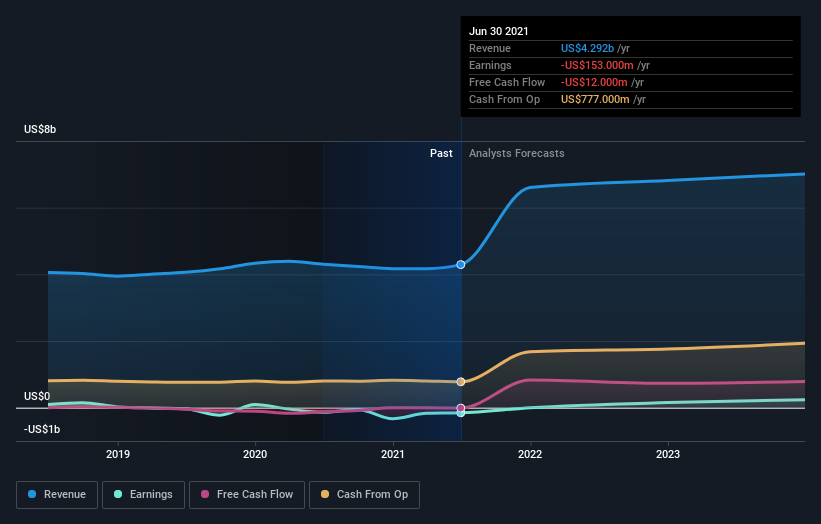Millicom International Cellular (NASDAQ:TIGO) shareholders have endured a 28% loss from investing in the stock three years ago
In order to justify the effort of selecting individual stocks, it's worth striving to beat the returns from a market index fund. But the risk of stock picking is that you will likely buy under-performing companies. We regret to report that long term Millicom International Cellular S.A. (NASDAQ:TIGO) shareholders have had that experience, with the share price dropping 34% in three years, versus a market return of about 80%. Furthermore, it's down 10% in about a quarter. That's not much fun for holders.
Since shareholders are down over the longer term, lets look at the underlying fundamentals over the that time and see if they've been consistent with returns.
See our latest analysis for Millicom International Cellular
Millicom International Cellular wasn't profitable in the last twelve months, it is unlikely we'll see a strong correlation between its share price and its earnings per share (EPS). Arguably revenue is our next best option. When a company doesn't make profits, we'd generally expect to see good revenue growth. As you can imagine, fast revenue growth, when maintained, often leads to fast profit growth.
Over three years, Millicom International Cellular grew revenue at 2.4% per year. Given it's losing money in pursuit of growth, we are not really impressed with that. Indeed, the stock dropped 10% over the last three years. If revenue growth accelerates, we might see the share price bounce. But ultimately the key will be whether the company can become profitability.
The graphic below depicts how earnings and revenue have changed over time (unveil the exact values by clicking on the image).
Millicom International Cellular is a well known stock, with plenty of analyst coverage, suggesting some visibility into future growth. If you are thinking of buying or selling Millicom International Cellular stock, you should check out this free report showing analyst consensus estimates for future profits.
What about the Total Shareholder Return (TSR)?
Investors should note that there's a difference between Millicom International Cellular's total shareholder return (TSR) and its share price change, which we've covered above. Arguably the TSR is a more complete return calculation because it accounts for the value of dividends (as if they were reinvested), along with the hypothetical value of any discounted capital that have been offered to shareholders. Millicom International Cellular's TSR of was a loss of 28% for the 3 years. That wasn't as bad as its share price return, because it has paid dividends.
A Different Perspective
Millicom International Cellular shareholders gained a total return of 12% during the year. But that was short of the market average. On the bright side, that's still a gain, and it is certainly better than the yearly loss of about 0.7% endured over half a decade. So this might be a sign the business has turned its fortunes around. While it is well worth considering the different impacts that market conditions can have on the share price, there are other factors that are even more important. Take risks, for example - Millicom International Cellular has 1 warning sign we think you should be aware of.
If you like to buy stocks alongside management, then you might just love this free list of companies. (Hint: insiders have been buying them).
Please note, the market returns quoted in this article reflect the market weighted average returns of stocks that currently trade on US exchanges.
This article by Simply Wall St is general in nature. We provide commentary based on historical data and analyst forecasts only using an unbiased methodology and our articles are not intended to be financial advice. It does not constitute a recommendation to buy or sell any stock, and does not take account of your objectives, or your financial situation. We aim to bring you long-term focused analysis driven by fundamental data. Note that our analysis may not factor in the latest price-sensitive company announcements or qualitative material. Simply Wall St has no position in any stocks mentioned.
Have feedback on this article? Concerned about the content? Get in touch with us directly. Alternatively, email editorial-team (at) simplywallst.com.


